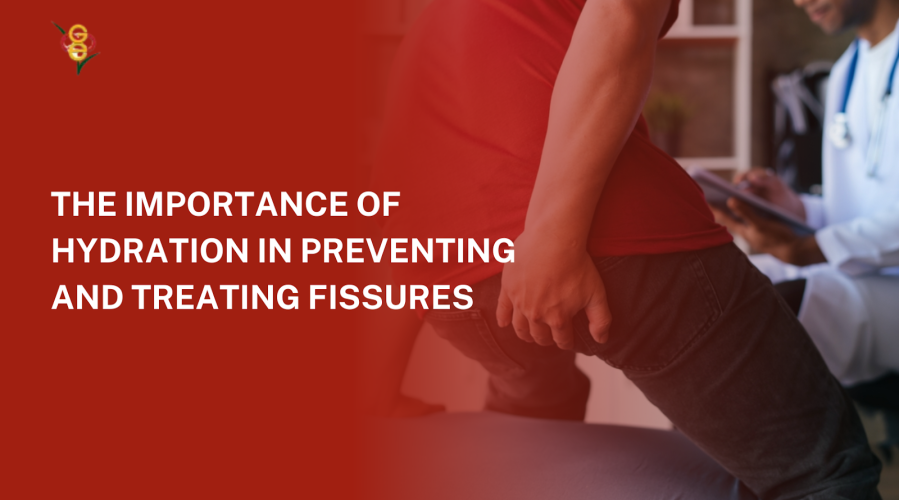Learn effective solutions for digestive problems with expert tips to improve gut health, reduce discomfort, and maintain a healthy digestive system.
The Importance of Hydration in Preventing and Treating Fissures

Fissures are small cracks or tears in the mucous membrane of the anal canal and can be painful, painful and bleed when passing stool. There are several causes of fissures and although they are not major complications, one of the best preventative measures as well as remedies is drinking adequate water. In this blog let me share why water is important and how it relates to fissure treatment.
Understanding the Role of Hydration
The human body requires water in most of its functions, and this is not an exception when it comes to the digestive system. If your body is well hydrated, then it can regulate the passage of stool appropriately, and that is why you will find that your stool is soft. This minimizes the chances of stretching, which is among the causes of anal fissures.
On the other hand, lack of enough water causes formation of hard and dry feces that are difficult to expel. Attempts to strain in order to avoid these stools can cause tearing in the anal lining and create fissures. Fissure treatment often includes hydration as a key element. Consequently, water intake is preventive but also considered as an essential component of fissure management.
How Hydration Prevents Fissures
- Softens Stools: There is also the effect of water that when one drinks enough water, it aids in softening of stools hence no strain when passing them.
- Promotes Healthy Digestion: It helps in the process of digestion of food and helps in the proper functioning of the bowels.
- Reduces Constipation: Poor bowel movement which is a leading cause of fissures is greatly minimized if the body is well hydrated.
Such benefits explain why water is a natural and easily accessible means of keeping the anal area healthy and free of fissures.
The Connection Between Hydration and Fissure Treatment
When it comes to people, who are already struggling with fissures, the need for hydration increases dramatically. Here’s how staying hydrated supports recovery:
- Speeds Healing: Hydration enhances the blood flow in the body and brings nutrients to the affected region to facilitate healing.
- Prevents Recurrence: This makes it easier to control further tearing or irritation of the perianal skin during defecation by making the stools soft.
- Enhances Overall Health: Hydration is important for immune health and thus important when dealing with wounds such as fissures.
The first advice that a person may be given if he or she is looking for the best fissure treatment in Coimbatore is to ensure that he or she is well-hydrated. Additionally, those considering fistula treatment in Coimbatore can also benefit from the professional care offered at GEM Hospital.
Practical Tips for Staying Hydrated
- Set a Daily Water Goal: Try to have 8-10 glasses of water a day. This amount may vary depending on the need of an individual and the level of activity that is being done.
- Incorporate Hydrating Foods: Eat more foods that contain water in them, like cucumbers, watermelons and oranges.
- Limit Dehydrating Beverages: Avoid taking foods that contain caffeine and alcohol since they interfere with the body’s ability to produce enough fluids.
- Carry a Water Bottle: Carry along a water bottle to make sure you are taking water at some point in the day.
- Listen to Your Body: Pay attention to signs of dehydration, such as dark urine, dry mouth, or fatigue, and increase your water intake as needed.
Complementing Hydration with Other Measures
Although drinking water is one of the most important recommendations in the prevention and treatment of fissures, there are other habits that should be adopted. These include:
- High-Fibre Diet: Consuming more fibre-containing foods like whole grains, beans and green leafy vegetables can still enhance passage of stools.
- Regular Exercise: Exercise also aids in digestion and thus prevents cases of constipation.
- Good Bathroom Habits: Do not force yourself when defecating and also do not try to hold on for a bowel movement as much as possible.
- Medical Care: If the crack is chronic or large, seek the services of a doctor. There are current treatment possibilities for fissures: medicamental therapy and non-surgical interventions.
The Role of GEM Hospital in Fissure Treatment
In this case, it is important that those with fissures consult a professional. At our hospital, the team of experienced specialists gives sophisticated solutions according to the needs of the patients. Whether it is a detailed assessment or the best available crack therapy, GEM Hospital will provide you with comfort and healing.
Drinking water is one of the easiest ways to prevent fissures but it should be taken in large proportions. If you are taking adequate water and following a healthy diet you are not likely to develop fissures and if they are already present they can be effectively treated. If you require professional attention, you can rely on GEM Hospital for the best fissure treatment to make you comfortable again. Stay hydrated and start making the first positive change towards improving digestive and anal health.
Blogs & Article
Explore current research trends in digestive health, including new treatments, advanced diagnostics, and innovations improving gut health and patient care.
Discover common digestive health myths and the real facts. Learn simple tips to improve gut health and maintain better digestion for a healthier life.


